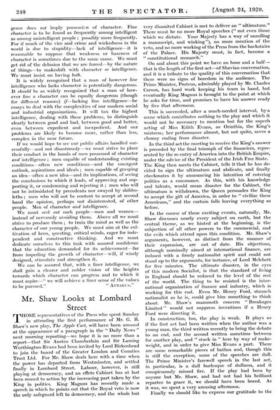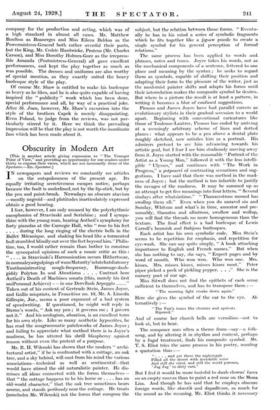Mr. Shaw Looks at Lombard
Street
THOSE representatives of the Press who spent Sunday in attending the first performance of Mr. G. B. Shaw's new play, The Apple Cart, will have been amused at the appearance of a paragraph in the "Daily News" next morning reporting—we hope it is no more than a report—that Sir Austen Chamberlain and Sir Laming Worthington-Evans had been invited by Lord Birkenhead to join the board of the Greater London and Counties Trust Ltd. For Mr. Shaw deals here with a time when the power has departed from Westminster, and settled finally in Lombard Street. Labour, however, is still playing at democracy, and an effete Cabinet has at last been roused to action by the increasing part taken by the King in politics. King Magnus has recently made a- speech in which he points out that the Royal veto is now the only safeguard left to democracy, and the whole but very disunited Cabinet is met to deliver an "ultimatum." There must be no more Royal speeches (" not even those which we dictate. Your Majesty has a way of unrolling a manuscript, and winking"), no more mention of the veto, and no more working of the Press from the backstairs of the Palace. His Majesty must, in fact, become a "constitutional monarch."
On and about this point we have an hour and a half— that is the length of the first act—of Shavian conversation, and it is a tribute to the quality of this conversation that there were no signs of boredom in the audience. The Prime Minister, Proteus, admirably played by Mr. Charles Carson, has hard work keeping his team in hand, but eventually King Magnus is brought to the point at which he asks for time, and promises to have his answer ready by five that afternoon.
This is succeeded, after a much-needed interval, by a scene which contributes nothing to the play and which it would not be necessary to mention but for the superb acting of Miss Edith Evans, as Orinthia, the King's mistress; her performance almost, but not quite, saves a clumsy ending from disaster.
In the third act the meeting to receive the King's answer is preceded by the final triumph of the financiers, repre- sented by the re-entry of America into the British Empire, under the advice of the President of the Irish Free State. The King then meets the Cabinet, tells it that he has de- cided to sign the ultimatum and abdicate, and finally checkmates it by announcing his intention of entering politics as a commoner. As this, with his knowledge and talents, would mean disaster for the Cabinet, the ultimatum is withdrawn, the Queen persuades the King to accept the gift of America, in order to "civilize these Americans," and the curtain falls leaving everything as before.
In the course of these exciting events, naturally, Mr. Shaw discusses nearly every subject on earth, but the central theme, as we hinted at the beginning, is the subjection of all other powers to the commercial, and the evils which attend upon this condition. Mr; Shaw's arguments, however, as distinct from the manner of their expression, are out of date. His objections, although nominally aimed at international finance, are imbued with a firmly nationalist spirit and could not stand up to the arguments, for instance, of Lord Melchett for five minutes. The ultimate disaster, in the eyes of this modern Socialist, is that the standard of living in England should be reduced to the level of the rest of the world. The thing to be resisted is the inter- national organization of finance and industry, which is working for this end. Even Mr. Henry Ford, staunch nationalist as he is, could give him something to think about. Mr. Shaw's mammoth concern "Breakages Limited" would not suppress inventions if a Henry Ford were directing it.
In construction, too, the play is weak. It plays as if the first act had been written when the author was a young man, the third written recently to bring the debate to an end, and the second written sometime between for another play, and "stuck in" here by way of make- weight, and in order to give Miss Evans a part. There are some remarkable pieces of bathos and, though this is still the exception, some of the speeches are dull. The Prime Minister's farewell speech in the last act, in particular, is a dull burlesque of dullness, and it conspicuously missed fire. If the play had been by anyone but Mr. Shaw, and had not had his brilliant repartee to grace it, we should have been bored. As it was, we spent a very amusing afternoon.
Finally we should like to express our gratitude to the company for the production and acting, which was of a high standard in almost all cases. Mr. Matthew Boulton as Boanerges and Miss Eileen Beldon as the Powermistress-General both rather overdid their parts, but the King, Mr. Cedric Hardwicke, Proteus (Mr. Charles Carson), and Miss Dorothy Holmes-Gore as the irrepress- ible Amanda (Postmistress-General) all gave excellent performances, and kept the play together as much as was possible. The dresses and uniforms are also worthy of special mention, as they exactly suited the heavy burlesque style of the play.
Of course Mr. Shaw is entitled to make his burlesque as heavy as he likes, and he is also quite capable of having inspired the " publicity " work which has been done, special performance and all, by way of a practical joke. After St. Joan, however, Mr. Shaw's excursion into the style of the brothers Capek is merely disappointing. Even Poland, to judge from the reviews, was not par- ticularly stirred by it. Here we think the prevailing impression will be that the play is not worth the inordinate fuss which has been made about it.































 Previous page
Previous page